|
|
|
Sort Order |
|
|
|
Items / Page
|
|
|
|
|
|
|
| Srl | Item |
| 1 |
ID:
174152
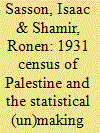

|
|
|
|
|
| Summary/Abstract |
This study sits at the intersection of census-making, colonialism, and the politics of statistical expertise. It considers the Palestine Census that the country’s British rulers had undertaken in 1931. It focuses on British intentions to include questions that could have yielded data about the alleged emergence of an Arab ‘landless class’. The validation of such a category would have justified British restrictions on Jewish immigration to Palestine. We trace the trajectory of ‘landlessness’ as a statistical category. We show that disparity in statistical expertise between Arab and Jewish experts, and a parity between Jewish and British experts, played a decisive role in shaping the census schedule. Consequently, Arab landlessness failed to become a valid statistical category. Our case highlights British census-making in India as a broad colonial model to be applied in other colonies and to be used as a scientific justification for Britain’s various political agendas.
|
|
|
|
|
|
|
|
|
|
|
|
|
|
|
|
| 2 |
ID:
137616
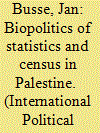

|
|
|
|
|
| Summary/Abstract |
This article addresses the importance of statistics for governing populations in the context of Palestine. On the basis of Michel Foucault's understanding of governmentality, I argue that social statistics represent crucial biopolitical technologies of governmentality. While statistical knowledge as a modern phenomenon originated in Western Europe in the late eighteenth and early nineteenth centuries, the case of Palestine clearly shows the importance of modern statistics beyond the OECD world. In a first step, I will elaborate on the emergence of social statistics as modern phenomena for governing populations. In this regard, the “discovery of the population” represents a fundamental prerequisite for the “birth of modern statistics” and the systematic utilization of statistical data for governing purposes. On this basis, I will argue social statistics are of crucial importance for governing the daily lives of the Palestinian population. Moreover, I will present the emergence of Palestinian statistics as a global phenomenon. It will become evident that social statistics and inferred demographic politics are essential for the sustainment of societal order in Palestine. This is particularly so regarding related inclusionary and exclusionary dynamics—namely Palestinian nation-building on the one hand and the Palestinian–Israeli demographic contestation on the other.
|
|
|
|
|
|
|
|
|
|
|
|
|
|
|
|
| 3 |
ID:
122655
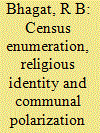

|
|
|
|
|
| Publication |
2013.
|
| Summary/Abstract |
Census is considered to be a scientific exercise. However, it leaves a deep impact on religious and ethnic identities. This is because through census enumeration not only are boundaries of communities fixed, but also actual size and growth are known. This adds a new sense to the identities of the religious communities in the sphere of democratic politics. In India, the census was started around 1872 during the British rule, seven decades after the first census was held in Great Britain in 1801. The question on religion was included right from the first Indian census, unlike the British census which only included it in 2001. This paper shows that the inclusion of the question on religion, and the consequent publication of data on size and growth of population by religion during British rule, invoked sharp communal reactions. The demographic issues found a core place in the communal discourse that continued in independent India. The paper argues that the demographic data on religion was one of the important factors that raised Hindu-Muslim consciousness and shaped the Hindu and Muslim relationship in both colonial and postcolonial India. As a result, several demographic myths have found a place in the communal discourse shaping the political imagination of India.
|
|
|
|
|
|
|
|
|
|
|
|
|
|
|
|
| 4 |
ID:
081260
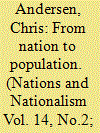

|
|
|
|
|
| Publication |
2008.
|
| Summary/Abstract |
Between 1996 and 2001 the 'Métis population' of Canada skyrocketed from 204,000 to 292,000, an astonishing and demographically improbable increase of 43 per cent. Most puzzling about this 'increase' is not so much the unpersuasive explanations offered by statisticians and others but, more fundamentally, the underlying assumption that such a thing as a 'Métis population' exists at all. In contrast, I argue that such an idea constitutes an artifact of Canada's racial/colonial episteme in which 'the Métis' - formerly an indigenous nation invaded and displaced in the Canadian nation-state's westward expansion - have been reduced in public and administrative discourse to include any indigenous individual who identifies as Métis: reduced, in other words, to (part of) a race. The paper argues further that the authority of the Canadian census as a privileged forum of contemporary meaning-making in Canadian society is such that the lack of explicit Census categories to distinguish Métis Nation allegiance further naturalises a racialised construction of Métis at the expense of an indigenously national one
|
|
|
|
|
|
|
|
|
|
|
|
|
|
|
|
| 5 |
ID:
187123
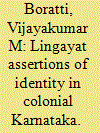

|
|
|
|
|
| Summary/Abstract |
In the wider context of how census enumeration has been studied with varied academic interests in South Asian history, this article focuses on how the Lingayats of Karnataka, since the colonial period, received, negotiated and manipulated their hurtful description in the 1881 Census as a low-caste Hindu community, defending themselves against British and Brahmins’ misuse of taxonomic navigation.
|
|
|
|
|
|
|
|
|
|
|
|
|
|
|
|
| 6 |
ID:
137914
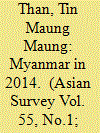

|
|
|
|
|
| Summary/Abstract |
Myanmar saw some progress in efforts at constitutional amendment and ceasefire negotiations, both pressing issues. Attempts to introduce proportional representation failed in the lower house of Parliament. Critics pointed out stalled reforms. The economy achieved high growth, and foreign direct investment increased. Myanmar reveled in its role as ASEAN chair and host for President Obama’s visit.
|
|
|
|
|
|
|
|
|
|
|
|
|
|
|
|
| 7 |
ID:
145336
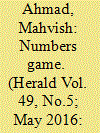

|
|
|
| 8 |
ID:
152513
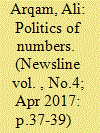

|
|
|
| 9 |
ID:
182850
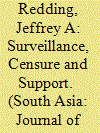

|
|
|
|
|
| Summary/Abstract |
Gender counting has been a longstanding concern of South Asian politics. For the past several years, gender counting has taken on central importance in South Asia in a new register. In both Pakistan and India, as part of a larger discussion on transgender rights and welfare, the state has engaged in various efforts to count the number of transgender persons living within its borders. In this recent (trans)gender counting, we see not only progressive welfare ambitions, but also the resurgence of regressive attitudes and practices towards transgender individuals, the transgender community and kinship practices.
|
|
|
|
|
|
|
|
|
|
|
|
|
|
|
|
| 10 |
ID:
168256
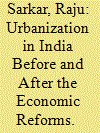

|
|
|
|
|
| Summary/Abstract |
The main objective of this paper is to analyze the recent trends and patterns of urbanization before and after the economic reforms in India. In addition, the paper explores the emerging patterns of urban growth and captures the changes through development indicators based on the available data from the Census of India and National Accounts Statistics. The study employs an exponential growth rate and a linear model for determining the pace of urbanization, which is then plotted on a scatter diagram. It is surprising to note that wherever urbanization was expected to accelerate, it has instead slowed down. Economic reforms have been not uniformly implemented because of the faulty national economic policy which has discouraged the growth of urban employment and is a cause for concern that requires political attention. The study concludes that economic reforms are necessary for accelerating urbanization, promoting small and medium-sized urban areas, human capital, socio-cultural mobility, and plans for eco-friendly green cities.
|
|
|
|
|
|
|
|
|
|
|
|
|
|
|
|
|
|
|
|
|